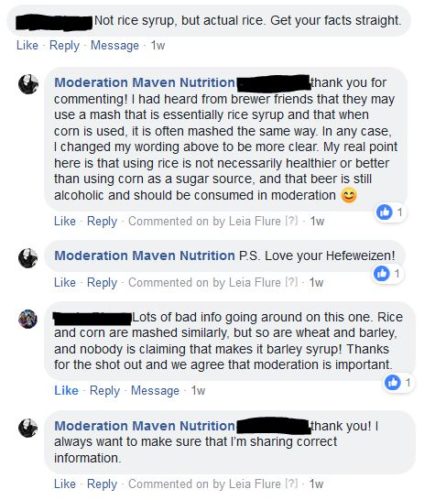Social media has transformed the way we have conversations, particularly around controversial topics. Who among us hasn't argued in the comments on Facebook or gotten caught up in a tweetstorm on Twitter?
As humans, this can actually be quite threatening to our self-esteem. We will do anything to protect our sense of self when someone says we're wrong. We might dig in our heels on whatever it is that we believe (whether true or not). We might question whether it's worth it to voice opinions or try to correct misconceptions, maybe even to the point of avoiding confrontational conversations entirely.
Psst: I've been guilty of both of these things.
They say "if you can't take the heat, stay out of the kitchen," but most of us need to learn how to tolerate the mental discomfort that comes with being questioned by others, which usually results in questioning ourselves.
As a community nutrition educator and social media "warrior," I have lots of experience being criticized. Over time, I've developed coping skills to get through that initial emotional shockwave, respond appropriately, and yes, even admit when I'm wrong.
Here are my top tips for having more effective conversations, whether it's about food, agriculture, modern medicine, or any other topic that tends to get emotional.
1: Take a breather. Literally, take a few deep breaths and sit with the feeling of being called out. Yeah, it feels crappy, I know! Step away from your computer or phone. You don't need to immediately respond -- take some time to cool down.

2: Consider the new information. Is there any validity to what they are saying? If you need clarification on a point -- ask! Try phrases like, "I just want to make sure I understand your opinion on this.." or "If I'm understanding you correctly, you're saying that.." Reflect back the way you are understanding their point and they can then confirm or correct.
If you're going to ask for a citation, don't just say "Citation please!" Try phrasing it as, "That's new information for me. Could you please share a link to an article or research where I could read more about it?"

3: Respond. Did they provide you with a new perspective or share information you weren't aware of? It's okay to be wrong. Seriously. Or maybe they didn't provide you with adequate evidence to change your mind. No matter the case, remember that what you say is just as important as HOW you say it.
Remember that anything you write publicly on social media can be seen by others. How would you talk to that person if you were having the conversation face-to-face?
You also want to provide support for your claims and be as clear as possible in communicating what YOU think. Include language like "Here's where I'm coming from" and "Have you seen this article?" I also like to use phrases like "Those are good points to consider" and "Thank you for sharing that with me."
When you think you are/were wrong, don't "dirty delete." If a back and forth happened in the comments, leave that up. Bystanders/lurkers will read it and see it as an example. Whenever possible, I will update my post and say "Edited to add..."
This recently happened on my Facebook page. I shared an article about a Super Bowl ad where Budweiser had taken shots at other companies for using corn syrup. I initially stated that although they don't use corn syrup, they use rice syrup. I had gotten this information from a friend, but I was corrected. Take a look:

4: Move on. If you admitted you were wrong, congratulations! That takes a lot of guts. Perhaps you've heard of bias? That's the brain's way of making it REALLY hard to take in new information. Try not to dwell too much on the fact that you were wrong. It happens! What matters is that you were strong enough to check yourself. Next time, do it before you wreck yourself (AKA... fact check fact check fact check).
If you've reached a stalemate with the other person, it's okay. Say something like, "thanks for having this conversation with me, I appreciate the input and information."
Even if that particular person doesn't change their mind, perhaps they will be more open to new information later on, and the lurkers may also have learned something new! Every individual interaction counts and can add up to real change.


Great post…”Thanks for sharing!”
Exactly! 🙂 Thanks, Leah!